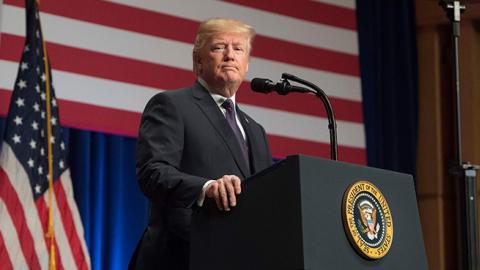Most National Security Strategy statements are appallingly platitudinous, numbingly conventional and quickly forgotten. In the history of the U.S. government, no ranking official in a moment of crisis has ended a bitter policy debate by turning to a dog-eared, well-thumbed copy of the current National Security Strategy and saying, “Wait, people! Just calm down! The answer is right here on page 37.”
Yet the Trump strategy represents a significant accomplishment. It reconciles the instincts of an unconventional president with the views of a more seasoned and conventional national-security team. The new approach breaks with the conventionally globalist assumptions of American foreign policy and instead embraces an older strategic approach.
As recently as the early 20th century, Britain ruled the waves and took the lead in the construction of a liberal, capitalist world system. During its long reign, two foreign-policy schools faced off over how to engage with Europe. On one side were advocates of a “continental” strategy, which prioritized alliances and close political cooperation with key European states. On the other were advocates of a “blue water” policy, who encouraged Britain to turn away from Europe and toward the open oceans, using its unique global position to maximize its power and wealth.
The bitter fight over Brexit shows that the blue-water-vs.-continentalist divide lives on in British politics. That division also matters in the U.S., Britain’s successor as the world’s leading naval and commercial power. In contemporary America, continentalists see the Atlantic world, and the thick institutional web that developed among the Cold War allies, as the template on which a peaceful global society can and should be built. From this perspective, the wisest American foreign policy would work through these international institutions and with Western partners to make the rest of the world look more like NATO and the European Union.
The Trump administration hews closer to the blue-water school. In the time of Pax Britannica, blue-water partisans believed Britain could accumulate great strength and wealth by advancing its interests in the wider world. This would do more to keep the country strong and respected than success in the intricate games of European diplomacy, they believed. A strong and rich Britain could always intervene in European politics if necessary to preserve the balance of power, and a globally dominant Britain would always be respected, even if it failed to make itself loved.
This is the view now driving many of America’s key foreign-policy decisions. The Trump administration sees the Paris climate accord as a potential obstacle to America’s recent exploitation of unconventional hydrocarbon resources, which has upended global power politics to America’s advantage. It sees current trade agreements as unfairly privileging commercial and geopolitical rivals like China. Above all, it sees itself embroiled in a geopolitical competition with China that cannot be won by invoking principles of multilateral institution-building and maxims of international law.
Asia before Europe, realism before liberal internationalism, American prosperity before global solidarity: This is a vision that appears to blend the pragmatic approach of the professionals in President Trump’s national-security team with the less disciplined but still sometimes acute insights that helped him win the election.
A modern blue-water approach to foreign policy need not entail abandoning the West, turning away from the world, or discarding the democratic ideals that resonate so deeply in American history. To the contrary, blue-water strategists in the Trump national-security team believe that it is American power, not multilateral institutions, that keeps the West afloat. If challenges to American power from countries like China, Russia, Iran and North Korea are successful, the wider West will weaken and crumble.
Lt. Gen. H.R. McMaster and his team deserve credit for finding ways to narrow the gap between President Trump’s strongly held personal views about foreign policy and the ideas embraced by mainstream Republicans. Whether they can make the strategy work in the real world remains an open question. But they appear to have done with this document all that an administration can hope to accomplish with a National Security Strategy—that is, to lay out the broad principles and elements of consensus on which the administration will base its work.
The world remains as unstable and crisis-prone as it did before the publication of the NSS. The Trump administration’s national security apparatus, on the other hand, seems to be finding its sea legs.

















